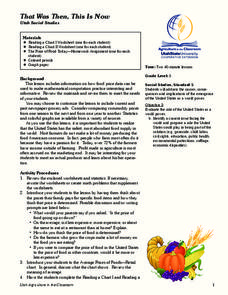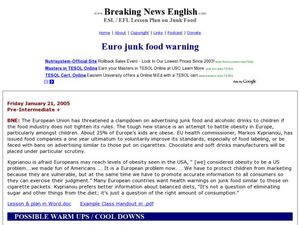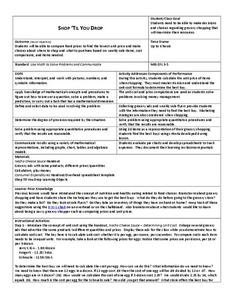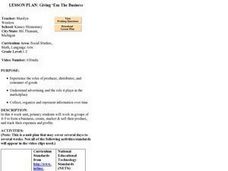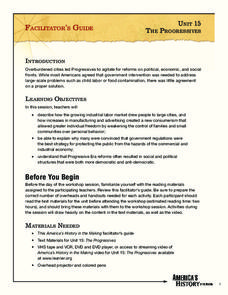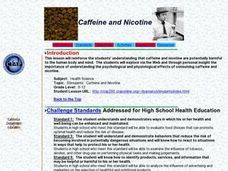Curated OER
That was Then, This is Now
Students compare and contrast data charts and statistics for food prices of now and in the past. In this food prices lesson plan, students answer short answer questions and calculate computations.
Curated OER
Energy Content of Foods
Learners collect data, organize and analyze the data and compare it to real life scenarios. This assignment requires two class periods.
Curated OER
Breaking News English: Euro Junk Food Warning
In this English worksheet, students read "Euro Junk Food Warning," and then respond to 47 fill in the blank, 7 short answer, 20 matching, and 8 true or false questions about the selection.
Curated OER
Packaging Tricks
Students become aware of the ways in which packaging is designed to attract kids. In a series of activites, students compare similar food products, assess nutritional value, and participate in field trip to see how packaging affects...
Curated OER
Giving'Em The Business
Students work in groups of 4-5 to form a business, create, market & sell their product, and track their expenses and profits. They experience the roles of producer, distributor, and consumer of goods. They collect, organize and...
Curated OER
Read That Label!
Students explore reading nutritional labels and making good food choices through simulation. They prepare and design a label for a product. In addition, they create packaging and advertising to ensure access to the population.
Curated OER
Cookie Creations
Learners, in teams, create and prepare an original cookie recipe. They market their cookie by designing creative packaging and advertising. They compete with other groups in a cookie contest.
Curated OER
Consumerism - Grocery Shopping
Students watch a video on how marketers plan their strategies in supermarkets. In groups, they are given a set amount of money and asked to go through a grocery store simulation with a list. After the simulation, they discuss the...
Curated OER
Shop 'Til You Drop
Learners evaluate food prices. In this real world math lesson plan, students compare the cost of various grocery items to determine which is the best deal. They work in groups using grocery ads to decide how to get the most product for...
Curated OER
Shop 'Til You Drop
Students compare food prices to find the lowest unit price and make choices about where to shop and what to purchase on weekly items, cost comparisons and items needed. They collect grocery ads and weekly sale flyer's to expedite their...
Curated OER
Giving Them the Business
Students work in small groups of 4-5 students to form a business, create, market and sell their product, and track their expenses and profits. They experience the roles of the producer, distributor, and consumer of goods.
Curated OER
How Much is a Pound? A Weight Lesson
Fourth graders explore weight in pounds. In this measurement lesson, students estimate the weight of teacher-provided objects, measure the actual weight of the objects using scales, and discuss food products sold by the pound....
Curated OER
Grocery Shopping
Students apply budgeting and shopping strategies. They study consumer shopping skills and guidelines to be a better shopper by comparing stores, comparing prices and unit pricing, brands, using coupons and not being fooled with...
Curated OER
Quench That Thirst
Students examine the sugar and calorie content of different beverages. In this adult health lesson, students analyze how advertising can be very misleading. They determine the correct amount of juice or beverage they should take per day.
Utah Education Network (UEN)
Vocabulary Consumerism
If you receive poor service, should you contact the FDA or the BBB? Discuss important economic terms with a vocabulary practice page. Learners fill in the blanks after each concept and elaborate on its function in the economy.
Curated OER
Is Modern Culture Ruining Childhood?
There are a lot of different ways a learner could respond to this New York Times article discussing the effects of modern culture on childhood. After reading the article, pupils construct a thoughtful blog post. The guiding questions...
Annenberg Foundation
The Progressives
The Progressive Era brought about a word that often leads to turmoil—change! Learners research the late 1800s in American history to uncover societal issues gripping the nation back in the day. The 15th lesson of a 22-part series...
Curated OER
Total English Advanced: Academic English
Advanced English language learners use the vocabulary bank at the top of the page to complete several sentences. Word choices include emphasise, notably, more, yet, regard, etc. Although the worksheet guide (page two) suggests it will...
Curated OER
Breaking News English: McDonalds
In this McDonalds worksheet, students read the article, answer true and false questions, complete synonym matching, complete phrase matching, complete a gap fill, answer short answer questions, answer discussion questions, write, and...
Curated OER
Setting Up Shop
Seventh graders investigate what goes in to starting a retail store. In this business economics lesson plan, 7th graders brainstorm products they would like to sell and use magazines, newspapers and real estate listings to bring their...
Curated OER
Black Hawk Island Hike
Students explore Wisconsin's natural and cultural history through hands-on exploration of Upham Woods. They are shown the basic paddling skills and they work in teams to paddle across the river on barge. Students describe cultural...
Curated OER
Caffeine and Nicotine
High schoolers research the effects of caffeine and nicotine online.
Curated OER
Safety Belts and the Media
Students discuss the importance of using their seat belts in cars. After viewing different public service announcements, they identify ones which made an impact on them. In groups, they draw their own announcement to educate others about...
Curated OER
Breaking News English: Anti-McDonald's McDavids Beat Goliath
In this English activity, students read "Anti-McDonald's McDavids Beat Goliath," and then respond to 8 multiple choice, 27 fill in the blank, 7 short answer, 20 matching, and 8 true or false questions about the...


